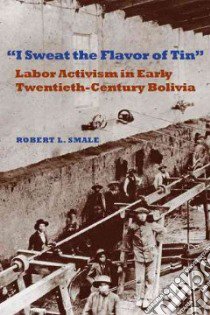I Sweat the Flavor of Tin - 9780822961178
Un libro in lingua di Smale Robert L. edito da Univ of Pittsburgh Pr, 2010
- € 35.10
- Il prezzo è variabile in funzione del cambio della valuta d’origine
"Smale provides fresh information on the emergence of the labor movement in Bolivia and has documented his case in innovative ways, using previously unknown sources from the region. A must-read for all those interested in labor history and the relationship between the peasantry and the working class in Latin America."ùErick D. Langer, Director, Center for Latin American Studies, Georgetown University
"In this important and finely wrought social history Smale explores the potent alchemy of worker activism and Socialist Party politics that periodically turned the tin mines of Oruro and northern Potosi into battlegrounds of popular mobilization and state violence. Shifting the focus away from the recent emphasis on indigenous peasant movements, Smale locates the urban popular classes and their revolutionary unions at center stage of the larger narrative of Bolivia's turbulent political history leading up to the Chaco War."ùBrooke Larson, Stony Brook University
On June 4, 1923, the Bolivian military turned a machine gun on striking miners in the northern Potosi town of Uncia. The incident is remembered as Bolivia's first massacre of industrial workers and highlights a formative period in the development of a working class that would eventually challenge the oligarchic control of the nation.
Robert L. Smale begins his study as Bolivia's mining industry transitioned from silver to tin, specifically focusing on the region of Oruro and northern Potosi. Artisan mutual aid societies provided miners their first organizational models and the guidance to emancipate themselves from the mine owners' political tutelage. During the first decade of the twentieth century, both the Workers' Labor Federation and the Socialist Party in Oruro spurred more aggressive political action. In 1920, miners won a comprehensive contract that exceeded labor legislation debated in Congress in the years that followed. Relations between the working class and the government deteriorated soon after, leading to the 1923 massacre in Uncia. Smale ends his study with the onset of the Great Depression and premonitions of war with Paraguayùtwin cataclysms that would discredit the old oligarchic order and open new horizons to the labor movement.
Informazioni bibliografiche
- Titolo del Libro in lingua: I Sweat the Flavor of Tin
- Sottotitolo: Labor Activism in Early Twentieth-century Bolivia
- Autore: Smale Robert L.
- Editore: Univ of Pittsburgh Pr
- Collana: Univ of Pittsburgh Pr (Paperback)
- Data di Pubblicazione: 28 Settembre '10
- Genere: HISTORY
- Argomenti : Tin miners Bolivia History 20th century Tin mines and mining Bolivia History 20th century Tin miners Labor unions Bolivia History 20th century
- Pagine: 243
- ISBN-10: 0822961172
- EAN-13: 9780822961178


